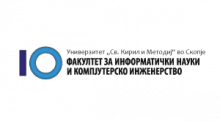| Име на трудот |
Место |
Држава |
|---|
| Pruning nodes in feedforward Neural Networks |
Proceedings of the VIII-th International konference of logics and informatics LIRA '97 |
Jugoslavija |
| Application of Neural Networks in Simulation of Hydrological sets |
Proceedings of XXI International Conference on Information Technology Interfaces ITI'99 |
Croatia |
| Analysis of the MSVMO method - the probabilistic SVM outputs |
Proceedings of 26-th International Conference on Information Technology Interfaces |
Croatia |
| NN Probabilistic Outputs in Character Recognition Problem |
Proceedings of the II-nd Balkan Conference |
Macedonia |
| Paralelna implementacija na Dirihleova tesalacija |
4-ти тематски ЕТАИ |
Македонија |
| Feedback transducer - neperiodiцni nizi dobieni so koneцni avtomati |
Proceedings 4-ти тематски ЕТАИ |
Македонија |
| Algotithms for Dirichlet Tessellation |
Proceedings of VII conference of logic and informatics LIRA '95 |
Jugoslavija |
| Data scaling in Feedforward Neural Networks |
Proceedings of XIX International Conference Information Technology Interfaces ITI'97 |
Croatia |
| Automatic Classification With Support Vector Machines In Molecular Biology |
Proceedings of III International conference of Cognitive and Neural sytems |
USA |
| A geometrical modification of SVM outputs for pattern recognition |
Proceedings of XXII International Conference on Information Technology Interfaces ITI'00 |
Croatia |
| A new approach of modifying SVM outputs |
Proceedings of IEEE-INNS-ENNS International Joint Conference on Neural Networks IJCNN'2000 |
Italy |
| Support Vector Machines as pattern classificator in Bioinformatics |
Proceedings of Second CIIT'01 |
Macedonia |
| SVM classifiers with moderated outputs for automatic classification in Molecular Biology |
Proceedings of Third Conference for Information Technology, CIIT’2002 |
Macedonia |
| Pattern recognition in DNA sequences using SVM classifiers with probabilistic outputs |
Proceedings of Mathematics and Informatics for Industry International Conference – MII 2003 |
Greece |
| Classification of DNA sequences using modified SVM outputs |
Proceedings of 13-ta International Conference of Artificial Neural Networks, ICANN /IJCNN |
Turkey |
| Recognition of human mitochondrial sequences using SVM |
Proceedings of The First Balcan Conference of Informatics, BCI’2003 |
Greece |
| Pattern recognition using Support vector machines and Multylayered feedforward Neural Networks |
PhD Thesis |
Macedonia |
| Learning system based on digital games |
CIIT |
Macedonia |
| Overview of modern file systems |
CIIT |
Macedonia |
| SA Tabu Miner - A Hybrid Heuristic Algorithm For Rule Induction |
URPDM |
Portugal |
| System for Management,Visualization and Maintenance of Infrastructural Resources |
TELFOR-2010 |
Serbia |
| An application for geospatial visualization of optical networks |
ICEST |
Macedonia |
| An Application for Maintaining Optical Networks |
ICT-Innovation |
Macedonia |
| Intelligent Systems – the Course |
Proceedings of Computational Intelligence and Information Technologies CIIT’08 |
Macedonia |
| Morphosyntacic Annotation of Macedonian Language using Support Vector Machines |
Proceedings of 30th MIPRO |
Croatia |
| DNA chips in bioinformatics |
Proceedings of Computational Intelligence and Information Technologies CIIT’07 |
Macedonia |
| Expert System for Taxonomy in Entomology |
proceedings 10th World Multiconference on Systemic, Cybernetics and Informatics (WMSCI 2006) |
USA |
| Teaching Bioinformatics to Computer Science Students |
Proceedings of IEEE EUROCON 2005 |
Serbia and Montenegro |
| MULTICATEGORY SUPPORT VECTOR MACHINES FOR CLASSIFICATION OF HUMAN URINARY CALCULI |
Proceegings of 14th International Symposium Spectroscopy in Theory and Practice |
Slovenia |
| NN Probabilistic Outputs in character recognition problem |
Proceedings of The Second Balcan Conference of Informatics, BCI’2003 |
Macedonia |
| Analysis of the MSVMO method - the probabilistic SVM outputs |
Proceedings of International Conference on Information Technology Interfaces |
Croatia |
| Probabilistic SVM outputs for pattern recognition using Analytical Geometry |
NEUROCOMPUTING, An International Journal, Elsevier |
|
| Bioinformatics – the Machine Learning approach |
Proceedings of Fourth Conference for Information Technology, CIIT’2003 |
Macedonia |
| Recognition of human mitochondrial sequences using SVM |
Proceedings of The First Balcan Conference of Informatics, BCI’2003 |
Greece |
| Classification of DNA sequences using modified SVM outputs |
of 13-th International Conference of Artificial Neural Networks, ICANN /IJCNN |
Turkey |
| Pattern recognition in DNA sequences using SVM classifiers with probabilistic outputs |
Proceedings of Mathematics and Informatics for Industry International Conference – MII |
Greece |
| SVM classifiers with moderated outputs for automatic classification in Molecular Biology |
Proceedings of Third Conference for Information Technology, CIIT’2002 |
Macedonia |
| Automatic classification in Molecular Biology using SVM classifiers |
Proceedings of NATO Advanced Study Institute on Learning Theory and Practice |
Belgium |
| Support Vector Machines as pattern classificator in Bioinformatics |
Proceedings of Second Conference for Information Technology, CIIT’2001 |
Macedonia |
| A new approach of modifying SVM outputs |
Proceedings of IEEE-INNS-ENNS International Joint Conference on Neural Networks |
Italy |
| A geometrical modification of SVM outputs for pattern recognition |
Proceedings of Conference on Information Technology Interfaces, ITI 2000 |
Croatia |
| Automatic Classification With Support Vector Machines In Molecular Biology |
Proceedings of the Third annual conference on Cognitive and Neural Systems |
USA |
| Application of Neural Networks in Simulation of Hydrological sets |
Proceedings of the XXI International Conference on Information Technology Interfaces |
Croatia |
| Data scaling in Feedforward Neural Networks |
Proceedings of the XIX-th International Conference in Information Technology Interfaces |
Croatia |
| Pruning nodes in Feedforward Neural Networks |
Proceedings of the VII-th International Conference in Logic and Computing, LIRA 97 |
Yugoslavia |
| Sequentional and parallel algorithms for Dirichlet Tessalation |
Proceedings of VIII-th Conference in Logic and Computing, LIRA 95 |
Yugoslavia |
| Parallel implementation of Dirichlet Tessalation |
Proceedings of Balkan Conference, ETAI |
Macedonia |
| Feedback transducer - nonperiodical arrays with finite automata |
Proceedings of Balkan Conference, ETAI |
Macedonia |


